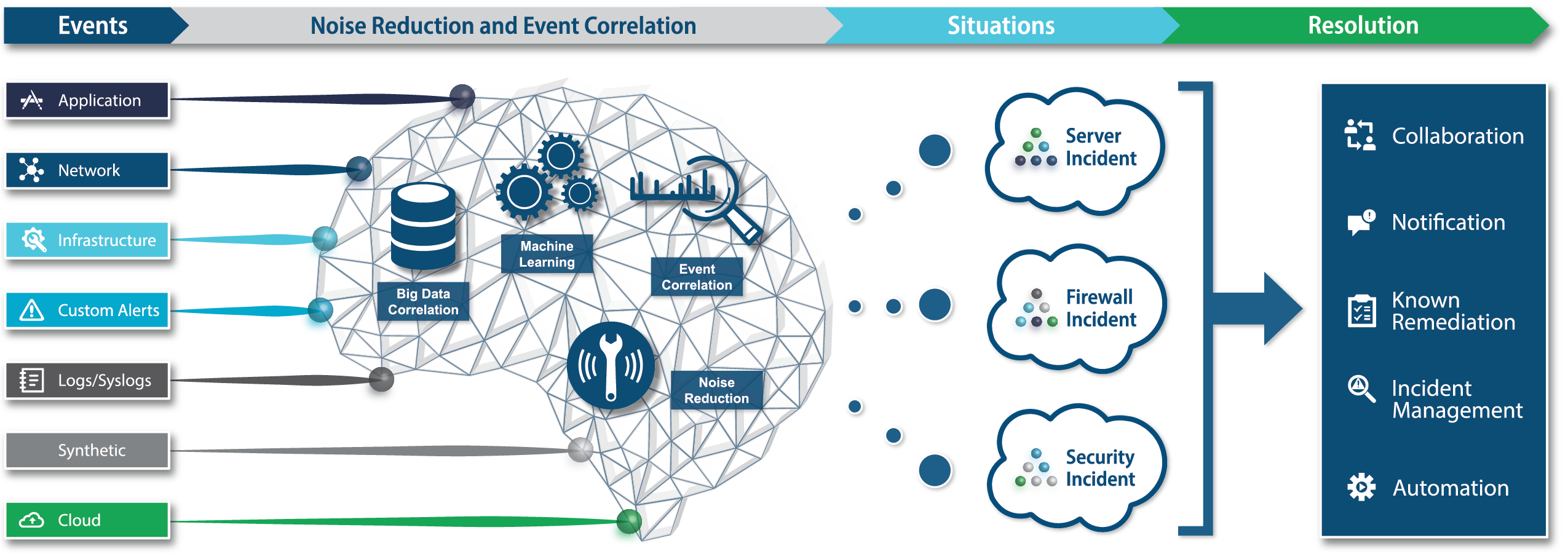AI Ops
Artificially Intelligent Operations (AIOps) is a technology platform that utilizes machine learning and big data analytics to improve, secure, and automate IT operations. AIOps helps Infrastructure and Operations (I&O) leaders to implement solutions for optimizing IT Operations and business value that enhance classical application performance monitoring, network performance monitoring, and diagnostics tools.
Mission Impact
- Automatically reduce alert volume and eliminate operational noise.
- Proactively detect incidents through smart correlation and clustering of alerts from across technology ecosystem.
- Streamline collaboration and automate workflow across teams and tools.
- Codify knowledge and automate sharing to increase efficiency and operator knowledge over time.
Features
- Event Correlation
- Noise Reduction (De-duplication, Filters, Blacklisting, etc.)
- Collaboration between Security and Operations
- Ecosystem Automation (Auto-ticketing, Auto-diagnostics, Escalation, etc.)
- Flexible implementation options (SaaS, On-Premise, Hybrid)
- Integration with third party tools (Splunk, Remedy, SolarWinds)
Use Cases
- Large and complex organization that needs to correlate vast amounts of event and incident data across many platforms.
- IT Operations needs to reduce the time to detect, mitigate, and analyze the root cause of IT incidents.
- IT Operations are siloed and monitoring needs to be centralized.
Infographic

Considerations
- According to industry best practices, it is recommended to implement AIOps functionality incrementally using an approach that focuses on historical data.
- Successful AIOps depends on the collection of immense quantities of various IT data (i.e., events, service tickets, performance metrics, logs, etc.). While gathering this data, many organizations have discovered that data can be missing, incomplete, unhelpful, garbled, full of noise, and inconsistent that negatively impact the systems learning capabilities.
- Data quality issues exposed during data collection could affect analytics and return results that are not trusted.
- To implement AIOps successfully, a clear definition of the critical problems need to address and ensure that business values are achieved and not implement “technology for technology’s sake.”
ValidaTek's Process
- Engineer and architect AIOps solutions
- Provide enterprise security consulting guidance
- Identify core challenges that could be solved through AIOps
a. Too much event volume, alerts, and duplication
b. Lack of monitoring
c. Tools visibility
d. No correlation across monitoring - Examine current IT operational environment and toolset to include:
a. Number of devices, operators, and teams - Types of tools (Chef, AppDynamics, Solarwinds, Remedy, etc.)
- Assess low-level capabilities required to
a. Reduce noise
b. Correlate events
c. Collaborate with teams
d. Automate monitoring functions - Define success criteria through Key Performance Indicators (KPIs) to measure success and Return on Investment (ROI)
- Provide AIOps recommendations through analysis of the current environment, challenges, and success criteria.
- Integrate, test, and implement AIOps products and solutions with existing IT infrastructures or Cloud services.
For More Information
Email: [email protected]
Phone: 703-972-2272




